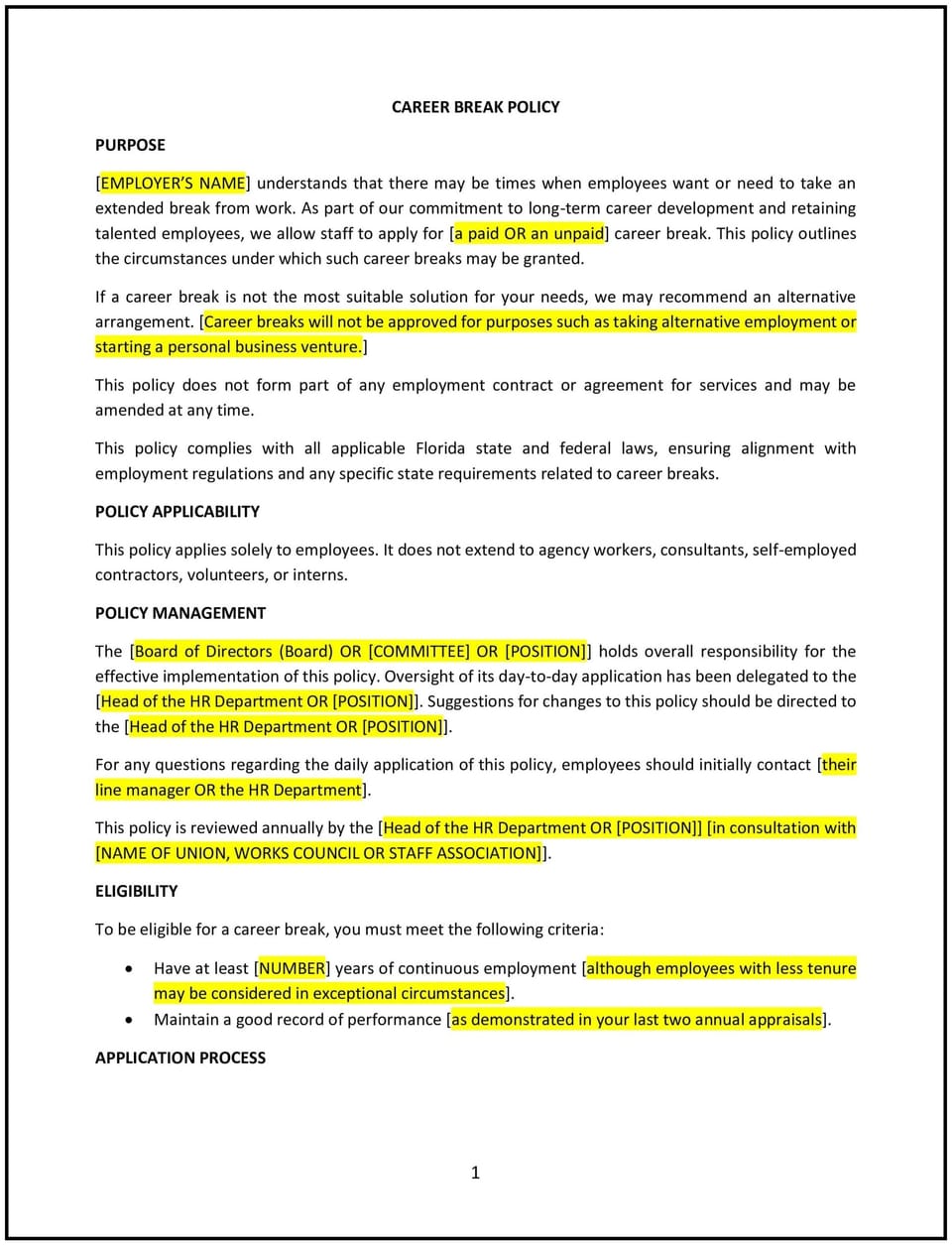Career break policy (Florida): Free template

Career break policy (Florida)
A career break policy helps Florida businesses provide employees with the option to take an extended leave of absence from work, typically for personal reasons, without jeopardizing their employment status. This policy outlines the process for requesting a career break, the duration of the break, and the terms of re-entry into the workforce, ensuring that employees can take the time they need while maintaining job security.
By implementing this policy, businesses can retain skilled employees who need time for personal development, family matters, or other life circumstances, while also ensuring that the organization’s operational needs are met during the employee’s absence.
How to use this career break policy (Florida)
- Define eligibility: Clearly specify which employees are eligible for career breaks, such as full-time employees with a certain length of service, and the conditions under which they can request a break.
- Set the duration of the break: Outline how long employees can take a career break, typically ranging from a few months to a year, and clarify whether the break is paid, unpaid, or partially paid.
- Establish the request process: Define the procedure employees must follow to request a career break, including submitting a formal application to HR, providing a reason for the break, and any supporting documentation required.
- Address re-entry and job security: Specify whether employees will be guaranteed their previous position or a similar role upon their return and whether they will receive any benefits or adjustments during the break period, such as maintaining health insurance or accruing leave.
- Set expectations for communication: Outline expectations for employees on staying in contact with the company during the break, such as periodic check-ins or updates on their status, if applicable.
- Provide flexibility and fairness: Allow for flexibility in approving career break requests, while ensuring that the policy is applied fairly and consistently to all eligible employees.
- Address the impact on operations: Plan for how the employee’s responsibilities will be managed during the break, including temporary coverage, delegation of duties, or hiring a substitute.
Benefits of using this career break policy (Florida)
This policy offers several benefits for Florida businesses:
- Enhances employee retention: Offering career breaks allows employees to take time off without losing their job security, making it more likely that they will return to the company after their break and stay long-term.
- Supports work-life balance: A career break policy supports employees’ need for personal time, such as pursuing education, caring for family members, or recovering from burnout, promoting better overall work-life balance.
- Reduces turnover costs: By allowing employees to take a break rather than leave the company permanently, businesses save on recruitment and training costs associated with hiring replacements.
- Maintains job security: Employees are reassured that their position will be available upon their return, increasing employee satisfaction and loyalty.
- Improves employer branding: Offering flexible career break options shows that the company cares about employee well-being and fosters a supportive, employee-friendly culture.
Tips for using this career break policy (Florida)
- Communicate the policy clearly: Ensure all employees understand the career break policy, including how to apply, eligibility criteria, the duration of breaks, and the process for returning to work.
- Encourage flexibility: Be flexible in considering career break requests and accommodate a wide range of personal situations, while balancing the needs of the business.
- Monitor employee well-being: Stay in touch with employees during their career break to ensure they remain engaged and feel supported, which can increase the likelihood of a successful re-entry into the workforce.
- Review the policy regularly: Periodically review the policy to ensure it remains aligned with Florida state laws, company practices, and evolving employee needs.
Q: Why is a career break policy important for my business?
A: This policy helps businesses retain talented employees who may need time off for personal reasons, while also ensuring operational needs are met during their absence. It promotes work-life balance and improves employee satisfaction and retention.
Q: How long can an employee take a career break?
A: The policy should specify the duration of a career break, typically ranging from a few months to a year, and whether the break is paid, unpaid, or partially paid. This should be outlined in the policy based on company guidelines.
Q: Can an employee guarantee their job upon returning from a career break?
A: The policy should outline whether employees will be guaranteed their previous position or a similar role upon their return, and whether they will maintain certain benefits, such as health insurance, during the break period.
Q: How should employees apply for a career break?
A: Employees should submit a formal application to HR, providing a reason for the break and any supporting documentation. The application process should be clearly defined in the policy, along with the expected timelines for approval.
Q: How often should this policy be reviewed?
A: This policy should be reviewed periodically, at least annually, or whenever there are changes in Florida laws, company practices, or employee needs, to ensure it remains relevant, effective, and compliant with any new regulations.
Q: What happens if an employee's career break affects company operations?
A: The policy should address how the company will manage the employee’s responsibilities during their break, such as delegating tasks to other employees, hiring a temporary replacement, or adjusting workloads to ensure smooth operations.
This article contains general legal information and does not contain legal advice. Cobrief is not a law firm or a substitute for an attorney or law firm. The law is complex and changes often. For legal advice, please ask a lawyer.


